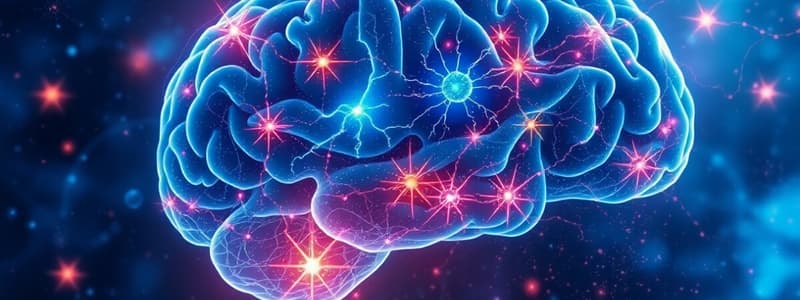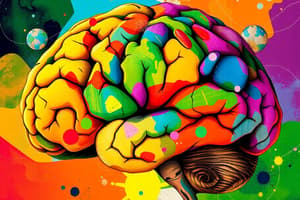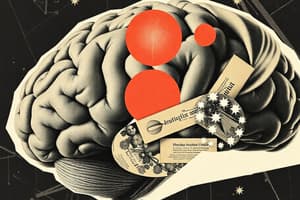Podcast
Questions and Answers
Which type of brain matter is primarily responsible for the brain's computation?
Which type of brain matter is primarily responsible for the brain's computation?
- Myelin
- White matter
- Grey matter (correct)
- Axons
What is the primary cause of the white color of white matter in the brain?
What is the primary cause of the white color of white matter in the brain?
- Presence of neurotransmitters
- The density of neurons
- Myelination of axons (correct)
- High glucose levels
Which biological factor is critical for both short-term and long-term impact on the nervous system?
Which biological factor is critical for both short-term and long-term impact on the nervous system?
- Neurotransmitters
- Dendrites
- Oxygen (correct)
- Synapses
What does the cortex of the brain mainly contribute to?
What does the cortex of the brain mainly contribute to?
What concept explains that all brain areas can be functionally connected despite not being directly linked?
What concept explains that all brain areas can be functionally connected despite not being directly linked?
What triggers the release of neurotransmitters into the synaptic cleft?
What triggers the release of neurotransmitters into the synaptic cleft?
How do receptors affect the receiving neuron?
How do receptors affect the receiving neuron?
What is the primary function of selective serotonin reuptake inhibitors (SSRIs)?
What is the primary function of selective serotonin reuptake inhibitors (SSRIs)?
What mechanism represents the action of drugs that mimic neurotransmitters?
What mechanism represents the action of drugs that mimic neurotransmitters?
What happens to free neurotransmitters in the synapse after their function is complete?
What happens to free neurotransmitters in the synapse after their function is complete?
What is synaptic plasticity primarily concerned with?
What is synaptic plasticity primarily concerned with?
Which process specifically involves the formation and elimination of synapses?
Which process specifically involves the formation and elimination of synapses?
What primary function does the somatic nervous system serve?
What primary function does the somatic nervous system serve?
What is the effect of drugs that act directly on ion channels?
What is the effect of drugs that act directly on ion channels?
What is functional reorganization in the context of neuroplasticity?
What is functional reorganization in the context of neuroplasticity?
Which type of neuron is specialized for receiving signals from other neurons?
Which type of neuron is specialized for receiving signals from other neurons?
Which of the following describes a characteristic of neurotransmitter receptors?
Which of the following describes a characteristic of neurotransmitter receptors?
What does neurogenesis refer to?
What does neurogenesis refer to?
What is a potential consequence of dysfunction in proteins within the nervous system?
What is a potential consequence of dysfunction in proteins within the nervous system?
What defines the resting membrane potential of a neuron?
What defines the resting membrane potential of a neuron?
Which method allows for direct examination of brain tissue?
Which method allows for direct examination of brain tissue?
What occurs during depolarization of a neuronal membrane?
What occurs during depolarization of a neuronal membrane?
What might cause neural cell death in the brain?
What might cause neural cell death in the brain?
What is the role of the autonomic nervous system?
What is the role of the autonomic nervous system?
What is a common result of practice in relation to brain activity?
What is a common result of practice in relation to brain activity?
What initiates an action potential in a neuron?
What initiates an action potential in a neuron?
Which method alters brain function to study its effects?
Which method alters brain function to study its effects?
How is the signal passed from one neuron to another when an action potential reaches the axon terminal?
How is the signal passed from one neuron to another when an action potential reaches the axon terminal?
Which component of a neuron is responsible for conducting electrical impulses away from the cell body?
Which component of a neuron is responsible for conducting electrical impulses away from the cell body?
What is misleading about the idea of specific brain areas being dedicated to certain functions?
What is misleading about the idea of specific brain areas being dedicated to certain functions?
What is highlighted as a more helpful way to understand psychological disorders?
What is highlighted as a more helpful way to understand psychological disorders?
What does neurobiology primarily study?
What does neurobiology primarily study?
Which of the following descriptions best defines systems neuroscience?
Which of the following descriptions best defines systems neuroscience?
What role does psychopharmacology play in neuroscience?
What role does psychopharmacology play in neuroscience?
Which statement reflects the relationship between neuro disciplines?
Which statement reflects the relationship between neuro disciplines?
What is studied in computational neuroscience?
What is studied in computational neuroscience?
What common feature do antipsychotics and street drugs share in psychopharmacology?
What common feature do antipsychotics and street drugs share in psychopharmacology?
What is the primary composition of grey matter in the brain?
What is the primary composition of grey matter in the brain?
Which factor is known to impact the nervous system in the long-term?
Which factor is known to impact the nervous system in the long-term?
What is a key characteristic of white matter in the brain?
What is a key characteristic of white matter in the brain?
Which structure of the brain is primarily responsible for folding to increase surface area?
Which structure of the brain is primarily responsible for folding to increase surface area?
How does the concept of a 'network of networks' relate to brain function?
How does the concept of a 'network of networks' relate to brain function?
What are the two main divisions of the nervous system?
What are the two main divisions of the nervous system?
Which part of the peripheral nervous system is responsible for voluntary movements?
Which part of the peripheral nervous system is responsible for voluntary movements?
What occurs when an action potential propagates down an axon?
What occurs when an action potential propagates down an axon?
What is the primary function of the autonomic nervous system?
What is the primary function of the autonomic nervous system?
Which part of a neuron is primarily responsible for receiving neurotransmitters?
Which part of a neuron is primarily responsible for receiving neurotransmitters?
What is synaptogenesis?
What is synaptogenesis?
What maintains the resting membrane potential in a neuron?
What maintains the resting membrane potential in a neuron?
Which process is described as a limited ability in the human brain?
Which process is described as a limited ability in the human brain?
Which of the following best describes the action potential's initiation?
Which of the following best describes the action potential's initiation?
What characterizes the sympathetic nervous system?
What characterizes the sympathetic nervous system?
What does functional reorganization in the brain involve?
What does functional reorganization in the brain involve?
What type of study would involve altering brain function to examine the outcome?
What type of study would involve altering brain function to examine the outcome?
Which of the following outcomes is a consequence of practice based on neuroplasticity?
Which of the following outcomes is a consequence of practice based on neuroplasticity?
What does neuroplasticity encompass?
What does neuroplasticity encompass?
Which term describes the process of neurons dying as a natural mechanism?
Which term describes the process of neurons dying as a natural mechanism?
What does synaptic plasticity specifically refer to?
What does synaptic plasticity specifically refer to?
Why is the notion that certain brain areas are dedicated to specific functions considered misleading?
Why is the notion that certain brain areas are dedicated to specific functions considered misleading?
What is the main focus of systems neuroscience?
What is the main focus of systems neuroscience?
Which of the following includes substances that alter mental states?
Which of the following includes substances that alter mental states?
How should psychological disorders be categorized according to the content?
How should psychological disorders be categorized according to the content?
What area of study focuses on the nervous system at a molecular and cellular level?
What area of study focuses on the nervous system at a molecular and cellular level?
What can lead to confusion among different 'neuro' disciplines?
What can lead to confusion among different 'neuro' disciplines?
Which statement best describes an approach to understanding cognitive functions?
Which statement best describes an approach to understanding cognitive functions?
Which type of neuroscience specifically studies the interactions of medications and drugs with the nervous system?
Which type of neuroscience specifically studies the interactions of medications and drugs with the nervous system?
What role do receptors play in neuronal communication?
What role do receptors play in neuronal communication?
What happens to neurotransmitters after they have performed their function?
What happens to neurotransmitters after they have performed their function?
What does the action of SSRIs primarily achieve in the synaptic cleft?
What does the action of SSRIs primarily achieve in the synaptic cleft?
What is the term for drugs that mimic neurotransmitters and activate specific receptors?
What is the term for drugs that mimic neurotransmitters and activate specific receptors?
How do drugs that act on ion channels influence neuronal activity?
How do drugs that act on ion channels influence neuronal activity?
What is one way that drugs can selectively affect certain brain circuits or systems?
What is one way that drugs can selectively affect certain brain circuits or systems?
What impact can dysfunction in proteins have on the nervous system?
What impact can dysfunction in proteins have on the nervous system?
Which of the following is NOT a way that drugs can modify neurotransmitter activity?
Which of the following is NOT a way that drugs can modify neurotransmitter activity?
Flashcards
What is Neuroscience?
What is Neuroscience?
The study of the nervous system, encompassing both the brain and other related structures.
Central Nervous System
Central Nervous System
Comprises the brain and spinal cord, acting as the central processing unit for the nervous system.
Peripheral Nervous System
Peripheral Nervous System
Handles communication between the central nervous system and the body's external environment. It transmits sensory information and controls muscle movement.
Somatic Nervous System
Somatic Nervous System
Signup and view all the flashcards
Autonomic Nervous System
Autonomic Nervous System
Signup and view all the flashcards
Sympathetic Nervous System
Sympathetic Nervous System
Signup and view all the flashcards
Parasympathetic Nervous System
Parasympathetic Nervous System
Signup and view all the flashcards
What is a Neuron?
What is a Neuron?
Signup and view all the flashcards
Brain as a Network
Brain as a Network
Signup and view all the flashcards
Cortex
Cortex
Signup and view all the flashcards
Grey Matter
Grey Matter
Signup and view all the flashcards
White Matter
White Matter
Signup and view all the flashcards
Myelination
Myelination
Signup and view all the flashcards
Synapse
Synapse
Signup and view all the flashcards
Neurotransmitters
Neurotransmitters
Signup and view all the flashcards
Receptors
Receptors
Signup and view all the flashcards
Neurotransmitter reuptake
Neurotransmitter reuptake
Signup and view all the flashcards
Selective serotonin reuptake inhibitors (SSRIs)
Selective serotonin reuptake inhibitors (SSRIs)
Signup and view all the flashcards
Agonists
Agonists
Signup and view all the flashcards
Antagonists
Antagonists
Signup and view all the flashcards
Selective drug action
Selective drug action
Signup and view all the flashcards
Neuroplasticity
Neuroplasticity
Signup and view all the flashcards
Synaptic plasticity
Synaptic plasticity
Signup and view all the flashcards
Synaptogenesis
Synaptogenesis
Signup and view all the flashcards
Synaptic pruning
Synaptic pruning
Signup and view all the flashcards
Neurogenesis
Neurogenesis
Signup and view all the flashcards
Neuronal migration
Neuronal migration
Signup and view all the flashcards
Functional reorganisation
Functional reorganisation
Signup and view all the flashcards
Direct interventional studies
Direct interventional studies
Signup and view all the flashcards
Levels of Explanation
Levels of Explanation
Signup and view all the flashcards
Neurobiology
Neurobiology
Signup and view all the flashcards
Systems Neuroscience
Systems Neuroscience
Signup and view all the flashcards
Psychopharmacology
Psychopharmacology
Signup and view all the flashcards
Brain Area Specialization
Brain Area Specialization
Signup and view all the flashcards
Cortical Column
Cortical Column
Signup and view all the flashcards
What is Neural Plasticity?
What is Neural Plasticity?
Signup and view all the flashcards
What is Synaptic Plasticity?
What is Synaptic Plasticity?
Signup and view all the flashcards
What is Synaptogenesis?
What is Synaptogenesis?
Signup and view all the flashcards
What is Synaptic Pruning?
What is Synaptic Pruning?
Signup and view all the flashcards
What is Neurogenesis?
What is Neurogenesis?
Signup and view all the flashcards
What is Neuronal Migration?
What is Neuronal Migration?
Signup and view all the flashcards
What is Functional Reorganization?
What is Functional Reorganization?
Signup and view all the flashcards
What are Direct Interventional Studies?
What are Direct Interventional Studies?
Signup and view all the flashcards
What is the Cortex?
What is the Cortex?
Signup and view all the flashcards
What is White Matter?
What is White Matter?
Signup and view all the flashcards
What is Grey Matter?
What is Grey Matter?
Signup and view all the flashcards
What is Neuroplasticity?
What is Neuroplasticity?
Signup and view all the flashcards
What is Transcranial Magnetic Stimulation (TMS)?
What is Transcranial Magnetic Stimulation (TMS)?
Signup and view all the flashcards
Neuron
Neuron
Signup and view all the flashcards
Action Potential
Action Potential
Signup and view all the flashcards
What is a Synapse?
What is a Synapse?
Signup and view all the flashcards
What are Neurotransmitters?
What are Neurotransmitters?
Signup and view all the flashcards
What are Receptors?
What are Receptors?
Signup and view all the flashcards
What is Neurotransmitter Reuptake?
What is Neurotransmitter Reuptake?
Signup and view all the flashcards
What are SSRIs?
What are SSRIs?
Signup and view all the flashcards
What are Agonists?
What are Agonists?
Signup and view all the flashcards
What are Antagonists?
What are Antagonists?
Signup and view all the flashcards
What is Selective Drug Action?
What is Selective Drug Action?
Signup and view all the flashcards
Synaptic Transmission
Synaptic Transmission
Signup and view all the flashcards
Study Notes
Introduction to Neuroscience
- Neuroscience is the study of the nervous system, encompassing more than just the brain.
- The nervous system is fundamentally divided into the central nervous system (CNS) and the peripheral nervous system (PNS).
- The nervous system's functions are greatly affected by various factors including proteins, cellular metabolic processes, large-scale bodily processes like oxygen and nutrient availability, and hormonal influences.
- The generation and regeneration of cells is also important, as seen in neurodevelopment and stem cell therapy, as well as disease processes such as Alzheimer's Disease.
Central Nervous System (CNS)
- The CNS consists of the brain and spinal cord.
- The brain is responsible for complex functions like thought, memory, and action.
- The spinal cord's function is primarily to transmit information between the brain and the rest of the body.
Peripheral Nervous System (PNS)
- The PNS comprises the nerves extending beyond the CNS.
- It is divided into two main branches: the somatic nervous system and the autonomic nervous system.
Somatic Nervous System
- The somatic nervous system deals with voluntary actions.
- It transmits information between the sensory organs and the muscles.
- This system has two types of nerves : sensory nerves (sensation) and motor nerves (muscle contraction).
- Spinal nerves transmit information via the spine
- Cranial nerves transmit information via the brainstem
Autonomic Nervous System
- The autonomic nervous system regulates involuntary functions.
- It maintains essential bodily functions like breathing, digestion, and heart rate.
- This system comprises two branches: the sympathetic nervous system (fight or flight) and the parasympathetic nervous system (rest and digest).
Neuron
-
The basic unit of the nervous system is the neuron.
-
Neurons consist of cell bodies, axons, dendrites.
-
The cell body houses the nucleus and other organelles, responsible for the cell's metabolism.
-
The axon transmits electrical impulses, typically in a myelin-sheathed fibre.
-
Myelin sheaths speed up transmission
-
Dendrites receive signals from other neurons.
-
Signal transmission progresses from dendrites to cell body to axon.
-
Although all neurons have similar basic components, many diverse types exist, each specialized for specific functions.
Communication (action potential)
- An electrical signal, the action potential, travels down the axon.
- Action potential results from the movement of charged particles (ions) across the axon membrane through channels.
- An unequal distribution of ions creates a resting membrane potential (-70mV).
- Positive ions flow into the axon, causing depolarization (change in membrane potential), triggering further channels to open—propagating the signal.
Communication between neurons
- Communication occurs at synapses.
- Neurotransmitters are released from the presynaptic neuron into the synaptic cleft.
- Receptors on the postsynaptic neuron receive the neurotransmitters.
- These events result in a change in the postsynaptic neuron's membrane potential.
- Neurotransmitters can be broken down by enzymes or reabsorbed by the presynaptic terminal.
Drug Action
- Drugs can modify neuron function at various levels.
- Some drugs inhibit the reuptake of neurotransmitters, leading to increased neurotransmitter availability.
- Other drug types mimic or block neurotransmitters to affect their receptors.
- Drugs can modify the function of ion channels in the membrane, changing the strength of the action potential.
Many Biological Factors
- Any factor that affects the nervous system can influence human function.
- Proteins, cell processes (e.g., neurodevelopment), and large-scale body factors (e.g., oxygen, glucose, hormones, and nutrients) all play crucial roles.
- The generation and regeneration of cells is important (e.g., Alzheimer's and stem cell therapy).
Brain Lobes
- The brain is divided into lobes: frontal, parietal, temporal, and occipital. Each lobe plays a role in specific cognitive functions.
Neuroanatomy
- Gray matter is composed of cell bodies and involved in computation, processing information.
- White matter is comprised of myelinated axons, which transmit signals across different brain regions and resemble "wiring" of the brain.
- The cortex consists of folded layers of gray matter, a characteristic that increases the surface area for sophisticated neural processing.
- Subcortical structures are deeper brain regions that serve specialized functions, for example the hippocampus and amygdala.
White Matter Tracts
- White matter tracts are pathways that connect different areas of the brain.
- Activity spread throughout the brain, even if connections are not directly shared by the regions.
- A modular, interconnected network describes the brain.
Network Change/ Neuroplasticity
- Neuroplasticity, the brain's potential to change in structure and function, underlies learning and adaptation.
- Changes in the structures and functions of neural networks are key to learning new things and adapting behavior.
Types of Neuroplasticity
- Synaptic plasticity: alterations in the strength of synaptic connections
- Synaptogenesis and synaptic pruning: creating or eliminating synapses
- Neurogenesis: generating new neurons
- Neuronal migration: neurons traveling to different brain regions
- Neural cell death (apoptosis): removing damaged or unnecessary neurons
- Functional reorganization: reassigning cognitive functions to different brain areas.
Neuroscience Methods
- Direct interventional studies include alterations of brain function (e.g., drugs, lesions, stimulation)
- Indirect measurements include examining brain tissue, metabolites, and neuroimaging to understand neural function—including in vivo and post-mortem analyses.
- Neuropsychological assessments use tests and tasks to study brain functions related to behaviour and cognitive ability.
Levels of Explanation
- To understand a disorder, it's better to consider different levels (e.g. social, psychological, cognitive, and biological), not consider them mutually exclusive.
Disciplines
- Neuroscience has multiple overlapping specializations with varying emphases
- Examples include computational neuroscience, cognitive neuropsychiatry, and neuropsychopharmacology.
Neurobiology
- Neurobiology focuses on the molecular and cellular interactions within the nervous system
- Neurobiology studies neuronal signaling, cell physiology, and genetics. Includes natural and artifical interventions & pathologies.
Systems Neuroscience
- Systems neuroscience examines neural networks as a whole. A range of scales, encompassing from interconnected neurons to larger brain circuits, are investigated in systems neuroscience.
Psychopharmacology
- Psychopharmacology specifically investigates neuronal mechanisms by which substances influence the mental state by acting on neurochemicals.
Neuropsychology
- Neuropsychology assesses the relationship between brain structure and function and human thoughts, feelings, and behaviour. It uses standardized tasks.
Cognitive Neuroscience
- Cognitive neuroscience explores neural correlates of thoughts, emotions and behaviour using intervention techniques like transcranial magnetic stimulation as well as neuroimaging.
Computational Neuroscience
- Computational neuroscience builds computer models of brain function to test theories.
Additional Information from the Text
- Different types of neurons, including multipolar, pyramidal, Purkinje, bipolar, and unipolar neurons, exist.
- Communication between neurons involves action potentials and neurotransmitters.
- The brain is a network of networks.
- The different uses of specific neurotransmitters and receptors in the brain's systems allows for drugs to selectively affect certain circuits, behaviors, and perceptual systems.
- The hippocampus and similar areas are key in cognition and memory but are not exclusively dedicated to these tasks.
- Various disciplines exist within neuroscience, emphasizing elements of a given system, like biological, cellular to larger-scale brain processes.
- Specific examples, such as how SSRIs work and how dopamine receptor occupancy differs across antipsychotics. There is also specific example information relating to brain damage (hemispatial neglect) through a case study of drawings.
Studying That Suits You
Use AI to generate personalized quizzes and flashcards to suit your learning preferences.
Related Documents
Description
Test your knowledge on the various functions of the brain, focusing on brain matter, neurotransmitters, and neural connections. This quiz covers key concepts in neuroscience, including synaptic plasticity, the role of the somatic nervous system, and the effects of certain drugs on brain activity. Challenge yourself with these thought-provoking questions!




